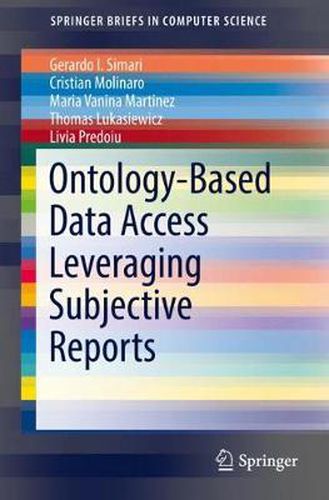Readings Newsletter
Become a Readings Member to make your shopping experience even easier.
Sign in or sign up for free!
You’re not far away from qualifying for FREE standard shipping within Australia
You’ve qualified for FREE standard shipping within Australia
The cart is loading…






This title is printed to order. This book may have been self-published. If so, we cannot guarantee the quality of the content. In the main most books will have gone through the editing process however some may not. We therefore suggest that you be aware of this before ordering this book. If in doubt check either the author or publisher’s details as we are unable to accept any returns unless they are faulty. Please contact us if you have any questions.
This SpringerBrief reviews the knowledge engineering problem of engineering objectivity in top-k query answering; essentially, answers must be computed taking into account the user’s preferences and a collection of (subjective) reports provided by other users. Most assume each report can be seen as a set of scores for a list of features, its author’s preferences among the features, as well as other information is discussed in this brief. These pieces of information for every report are then combined, along with the querying user’s preferences and their trust in each report, to rank the query results. Everyday examples of this setup are the online reviews that can be found in sites like Amazon, Trip Advisor, and Yelp, among many others.
Throughout this knowledge engineering effort the authors adopt the Datalog+/- family of ontology languages as the underlying knowledge representation and reasoning formalism, and investigate several alternative ways in which rankings can b
e derived, along with algorithms for top-k (atomic) query answering under these rankings. This SpringerBrief also investigate assumptions under which our algorithms run in polynomial time in the data complexity.
Since this SpringerBrief contains a gentle introduction to the main building blocks (OBDA, Datalog+/-, and reasoning with preferences), it should be of value to students, researchers, and practitioners who are interested in the general problem of incorporating user preferences into related formalisms and tools. Practitioners also interested in using Ontology-based Data Access to leverage information contained in reviews of products and services for a better customer experience will be interested in this brief and researchers working in the areas of Ontological Languages, Semantic Web, Data Provenance, and Reasoning with Preferences.
$9.00 standard shipping within Australia
FREE standard shipping within Australia for orders over $100.00
Express & International shipping calculated at checkout
This title is printed to order. This book may have been self-published. If so, we cannot guarantee the quality of the content. In the main most books will have gone through the editing process however some may not. We therefore suggest that you be aware of this before ordering this book. If in doubt check either the author or publisher’s details as we are unable to accept any returns unless they are faulty. Please contact us if you have any questions.
This SpringerBrief reviews the knowledge engineering problem of engineering objectivity in top-k query answering; essentially, answers must be computed taking into account the user’s preferences and a collection of (subjective) reports provided by other users. Most assume each report can be seen as a set of scores for a list of features, its author’s preferences among the features, as well as other information is discussed in this brief. These pieces of information for every report are then combined, along with the querying user’s preferences and their trust in each report, to rank the query results. Everyday examples of this setup are the online reviews that can be found in sites like Amazon, Trip Advisor, and Yelp, among many others.
Throughout this knowledge engineering effort the authors adopt the Datalog+/- family of ontology languages as the underlying knowledge representation and reasoning formalism, and investigate several alternative ways in which rankings can b
e derived, along with algorithms for top-k (atomic) query answering under these rankings. This SpringerBrief also investigate assumptions under which our algorithms run in polynomial time in the data complexity.
Since this SpringerBrief contains a gentle introduction to the main building blocks (OBDA, Datalog+/-, and reasoning with preferences), it should be of value to students, researchers, and practitioners who are interested in the general problem of incorporating user preferences into related formalisms and tools. Practitioners also interested in using Ontology-based Data Access to leverage information contained in reviews of products and services for a better customer experience will be interested in this brief and researchers working in the areas of Ontological Languages, Semantic Web, Data Provenance, and Reasoning with Preferences.